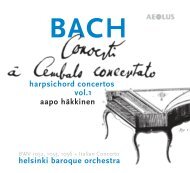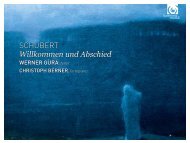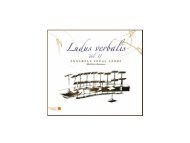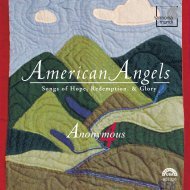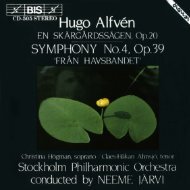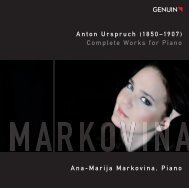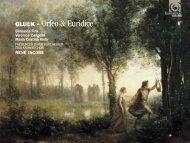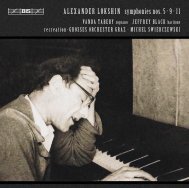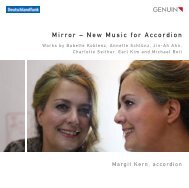SYMPOSIUM RECORDS CD 1117 ALFRED ORDA ... - eClassical
SYMPOSIUM RECORDS CD 1117 ALFRED ORDA ... - eClassical
SYMPOSIUM RECORDS CD 1117 ALFRED ORDA ... - eClassical
Create successful ePaper yourself
Turn your PDF publications into a flip-book with our unique Google optimized e-Paper software.
<strong>SYMPOSIUM</strong> <strong>RECORDS</strong> <strong>CD</strong> <strong>1117</strong><br />
<strong>ALFRED</strong> <strong>ORDA</strong>, baritone (1915-2004)<br />
This compact disc has been compiled from broadcast performances given<br />
between 1963 and 1977 in Poland. Alfred Orda was 62 when the last of these arias<br />
was recorded. His exceptionally wide-ranging operatic repertoire, with arias in<br />
Italian, Polish, Russian and French, is represented here.<br />
Alfred Orda-Wdowczak was born in Lodz on 9th July 1915. There was<br />
always singing in his life, for his mother had a good contralto voice. As a child he<br />
heard Battistini; the great Italian baritone became a life-long influence. While still<br />
at technical high school his vocal potential was recognized, and at 19 he had his<br />
first singing lessons with Adela Comte-Wilgocka at the Lodz Conservatorium.<br />
Soon, with a repertoire of 'Eri tu', 'Di Provenza', the Prologue from Pagliacci and<br />
Valentin's air from Faust, he set off on foot for Warsaw, a distance of 80 miles, in<br />
search of further training. He obtained an audition at the Conservatorium in<br />
Warsaw and he so impressed the Rector, Eugeniusz Morawski, that he gained a<br />
scholarship. He continued with his vocal studies under Mme. Comte-Wilgocka and<br />
he learned general repertoire and interpretative skills from Gregori Orloff. In<br />
Warsaw he was heard by Ferrari, the conductor of a visiting Italian opera company,<br />
and he was given a glowing testimonial. Following this, he was awarded a<br />
scholarship from the Municipality of Lodz to study in Italy. In 1936 he travelled to<br />
Milan, where for the next three years he studied under the direction of Alfredo<br />
Cecchi, a well-known teacher and coach, amongst whose students had been<br />
Basiola, Granda and Ziliani. A pupil of Antonio Cotogni, Cecchi had sung as a<br />
tenor in the company of many of the Golden Age stars, including Battistini in the<br />
first performance of Per la Patria in 1905. Orda spent entire days in Maestro<br />
Cecchi's studio, not just to have his singing lessons but in order to listen to other<br />
students, thereby acquiring facility in Italian and broadening his musicianship. In<br />
the evenings he attended opera performances and concerts. He started to collect<br />
music; one of his greatest treasures was Battistini's own working score of Werther,<br />
with the composer's dedication. He researched unusual operatic repertoire, later to<br />
become important in his recital programmes.<br />
Plans to spend the summer of 1939 with Cecchi in Naples had to be<br />
cancelled because of the outbreak of war. The invasion of Poland ended his<br />
scholarship remittances, and he went instead to Rome, where accommodation was<br />
offered in the Polish College, a seminary for theology students. Early in 1940,<br />
before political developments made it necessary for him to leave Italy, Orda was<br />
able to study with Cecchi's mentor, the 76 year old Mario Cotogni, son of Antonio.<br />
Orda's brief period of tuition in Rome was of very great value, for Mario Cotogni's<br />
teaching closely followed that of his father and was in the nineteenth century, preverismo<br />
Italian bel canto tradition. Cotogni accompanied Orda in his public concert<br />
début at this time.
Advised to leave Italy since war was imminent, Orda met up with other<br />
Polish students and refugees and made his way through France, together with the<br />
Polish forces. Eventually he reached England. He travelled to Scotland, and before<br />
long he was singing professionally. He was engaged as soloist with the Scottish<br />
Orchestra, conducted by Warwick Braithwaite; his first concert, on 12th January<br />
1941, contained 'Eri tu' and Prince Igor's aria. The correspondent of the Glasgow<br />
Evening Times reported on 13th January 1941 that "Orda proved himself a<br />
possessor of a voice of International Celebrity standard". Orda gave a second<br />
concert with this orchestra and conductor in the following year. The programme<br />
included the Prologue from Pagliacci. the Credo from Otello and 'Madamina' from<br />
Don Giovanni. The Glasgow Times reviewer wrote on the following day (5th<br />
January 1942) that "there are few living singers with a voice of such quality". The<br />
programme also included a Chopin song, The Warrior, in an orchestration by the<br />
conductor. While in Glasgow he met his future wife.<br />
In 1942, Orda made his first British operatic appearance, as Valentin in<br />
Faust with the Carl Rosa Company. In 1943 he was engaged by Sir Henry Wood<br />
for the Promenade Concert Season in the Royal Albert Hall. With Sir Adrian Boult<br />
and the BBC Symphony Orchestra he sang the Polonaise from Verbum Nobile by<br />
Moniuszko (included here) on 12th August. This appearance opened up a rich<br />
succession of concerts and recitals for the BBC, extending over 25 years, and Orda<br />
long remembered with gratitude the fine conductors, instrumentalists and producers<br />
who helped and encouraged him in his work through this period. A Times notice of<br />
this first Promenade Concert, appearing on 13th August 1944, describes Orda as "a<br />
baritone with a freely-produced, resonant but agreeably soft textured voice who<br />
flung forth his melody as it might have been early Verdi, and at once captured the<br />
audience".<br />
In 1944 he travelled to North America and he began a busy phase of his<br />
concert and operatic career. Initially, he appeared in Montreal. A review in the<br />
Montreal Star on 17th March 1944 describes "a baritone of uncommon richness<br />
and vitality, the like of which is not often heard". He travelled on to the United<br />
States. In 1945 and 1946 he was a member of the Polish Opera Company that gave<br />
performances in New York, Chicago, Philadelphia, Buffalo and Detroit. He<br />
continued. to receive glowing press notices. At a performance of La Bohème in<br />
Chicago on 13th January 1946, Orda (who was singing Marcel) reversed the<br />
famous Caruso-De Segurola episode by deputising for the tenor, temporarily<br />
amnesic, in the fourth act. Although Orda had a seamless high baritone extending<br />
in chest voice to top C, and on a later occasion at Sadler's Wells sang a memorable<br />
top B flat in octave with Leila in the finale of The Pearl Fishers, no great vocal<br />
heights had to be scaled, no more than Caruso had to plumb great depths in<br />
'Vecchia zimarra'. In 1946 he appeared as Silvio in Pagliacci with the City Center<br />
Opera in New York. Further operatic engagements in New York were in 1946-47,<br />
with the Salmaggi Company at the Brooklyn Academy of Music, as Escamillo,<br />
Tonio and Figaro (Il Barbiere di Siviglia), and in June 1947, in the summer season<br />
of the International Opera Company at the Carnegie Hall, when he sang Rigoletto.<br />
In 1948 he attended auditions at the Metropolitan Opera House. He sang 'Ai miei
ivali cedere' from Marchetti's Ruy Blas (thrillingly recorded, sixteen years later,<br />
and included on this disc). Georges Hirsch, the Director of the Paris Opera, was in<br />
New York at the time, and recruited him for the following season.<br />
Orda returned to Europe to appear as Valentin in Faust at the Paris Opera.<br />
His début was well received. The correspondent of Paris-Presse L'intransigeant<br />
wrote on 28th September 1949: "Je ne puis résister au désir de signaler un<br />
extraordinaire Valentin, baryton à la voix puissante et noble, à l'admirable<br />
plastique. Alfred Orda fut, en effet, la révélation de la soirée. Ne lereverrons-nous<br />
plus souvent, quand entendrons-nous ce magnifique chanteur dans Athanaël?"<br />
Although he was scheduled to sing this role in Massenet's Thaïs and also Zurga in<br />
Les Pêcheurs de Perles at the Opéra Comique, his Paris career was limited to<br />
several appearances in Faust. Unfortunately, the musicians in Paris went on strike<br />
in late Autumn 1949 and, since he was a guest artist, receiving fees on a<br />
performance basis ("Par spectacle") and not a regular monthly salary, it was<br />
necessary for him to return to London.<br />
From the end of 1949 to 1952, Alfred Orda worked as a recitalist in London<br />
and the provinces. In 1953 he joined the Sadler's Wells Opera Company. He<br />
remained a member for four years, during which time his roles included Alfio in<br />
Cavalleria Rusticana, Peter in Hänsel und Gretel, Zurga in Les Pêcheurs de Perles,<br />
the title role in Rigoletto, Michele in Il Tabarro, Escalus in Romeo and Juliet by<br />
Sutermeister, and Escamillo in Carmen. His Zurga was particularly admired; the<br />
correspondent of The Stage wrote that "Mr. Orda succeeded admirably and<br />
movingly in conveying the mental torture of the character, and in turn stirred both<br />
the intellect and the senses of the audience with his vocal resonance and technical<br />
skill". During the period in which he was singing at Sadler's Wells, he made a<br />
variety of other appearances. In December 1954-January 1955 he was engaged to<br />
sing in the Liceo in Barcelona in a Russian season, appearing as Pojarok in The<br />
Invisible City of Kitezh by Rimsky-Korsakov. He took part in further Promenade<br />
Concerts, in the main singing arias from Russian operas. In 1955 he shared a BBC<br />
studio concert with Joan Sutherland in a Hugo Wolf programme. Walter Goehr<br />
conducted the London Symphony Orchestra; Orda sang Goethe Lieder. In the same<br />
year he was baritone soloist in a performance of Pulcinella with the Leighton Lucas<br />
Orchestra. In 1956 he sang in two broadcast studio performances of Alceste by<br />
Gluck, in the roles of High Priest and Apollo. The Geraint Jones Singers and<br />
Orchestra were conducted by Geraint Jones and the other soloists included<br />
Flagstad, Raoul Jobin, Alexander Young, Thomas Hemsley and Marion Lowe.<br />
Further major concert engagements in 1956 were a Stravinsky programme in the<br />
Royal Festival Hall conducted by Sir Malcolm Sargent, in which be again sang in<br />
Pulcinella, and Janacek's Glagolitic Mass (earlier performed with the BBC<br />
Symphony Orchestra under Rafael Kubelik) in the Royal Festival Hall with the<br />
London Philharmonic Orchestra conducted by Jaroslav Krombholc.<br />
In 1957, increasing ill health forced Orda's resignation from Sadler's Wells<br />
Opera. This was a disappointment as he was scheduled to sing Di Luna in Il<br />
Trovatore, a high baritone role fitting his voice very well. It was with reluctance<br />
that he had to turn down an invitation from the Royal Opera House to sing the role
of Amonasro in Aïda in the 1958/59 Covent Garden season. From this period he<br />
concentrated on concert and recital work. He undertook a tour of Poland, during<br />
which he returned to the stage in the title role of Rigoletto at the Grand Opera,<br />
Warsaw. In 1959 he gave the first performances in Poland of the Serenade for<br />
baritone and orchestra by Sir Arthur Bliss with the Philharmonic Orchestra of<br />
Lodz. In the same concert he sang four Shakespeare sonnet settings by the Polish<br />
composer Tadeusz Baird. In the late 1950s and early 1960s he took part in a<br />
number of memorable concerts in the Royal Albert Hall and the Royal Festival<br />
Hall, singing Pater Ecstaticus in the first promenade performance of Mahler's<br />
Eighth Symphony, with the London Symphony Orchestra conducted by Jascha<br />
Horenstein, and in a subsequent performance conducted by Sir Charles Groves with<br />
the Royal Liverpool Philharmonic Orchestra. He also sang in the Royal Festival<br />
Hall performance of Schumann's Scenes from Faust with the BBC Symphony<br />
Orchestra conducted by Rudolf Schwarz, and the Nielsen Hymnus Amoris with the<br />
Royal Philharmonic Orchestra conducted by Charles Mackerras. Through the fifties<br />
and sixties he made many BBC studio broadcasts, including in his programmes<br />
works ranging from rare arias from Donizetti's Torquato Tasso and Maria Padilla,<br />
through Bruckner to Szymanowski and Kabalevsky. A recital of Russian and Polish<br />
songs recorded during this period has been published on Symposium 1067.<br />
From the early 1960s, Alfred Orda also appeared with regularity in Poland,<br />
making numerous broadcasts which included many fine performances of operatic<br />
excerpts, both standard and rare, some of which can be heard here. Increasingly his<br />
life became divided between London, where lived for many years, and Poland. He<br />
worked as a vocal advisor to the young opera singers in Lodz, and had the<br />
opportunity to meet the new generation of Polish composers, several of whom,<br />
notably Lefeld, Serocki, Mroszczyk, Kiesewetter, Czyz and Bauer, wrote for him.<br />
<strong>ALFRED</strong> <strong>ORDA</strong> OPERATIC RECITAL<br />
1 BERENICE: Si, Ira i ceppi (Handel; first produced 1737) (I)<br />
Demetreo's aria from Berenice, first heard at Covent Garden in May 1737, is an<br />
ardent protestation of a love which will burn fiercely even in captivity, and which<br />
death will not extinguish.<br />
2 DON SÉBASTIANO: Gioco di rea fortuna, povero Camoens! ... O Lisbona,<br />
alfin ti miro (Donizetti; 1843) (I)<br />
The soldier-poet Camoens has escaped from Africa and is overjoyed on his return<br />
home. He has been the plaything of cruel fate, but is now once more in Lisbon.<br />
3 RIGOLETTO: Cortigiani, vil razza dannata (Verdi; 1851) (I)<br />
Rigoletto curses the courtiers, and then begs for the deliverance of his daughter.<br />
4 VERBUM NOBILE: Recitative and aria-polonaise (Moniuszko; 1861) (P)<br />
This one-act opera is about two friends who have given their word of honour that<br />
one day their families will be joined by marriage. Here Pan Marcin introduces
himself to his friend's daughter, Suzanna.<br />
5 RUY BLAS: Io scacciato! Io bandito ... Ai miei rivali cedere (Marchetti;<br />
1869) (I) Marchetti's once-popular opera is based on the Victor Hugo play about<br />
the spurned minister seeking revenge on his queen by presenting his valet to court<br />
in the guise of a nobleman; the queen and the servant fall in love. Like Rigoletto,<br />
the story involves the interplay of the grotesque and the sublime so characteristic of<br />
the Romantic movement. In this scene Don Sallustio, his pride wounded, swears<br />
vengeance.<br />
6 I LITUANI: Cio ehe udii; cio che vidi ... O rimembranze gioje (Ponchielli;<br />
1874) (I)<br />
This Ricordi commission for La Scala was based on the same Mickiewicz poem as<br />
in track 11 below, dealing with the mediaeval struggle between the Lithuanians and<br />
the Teutonic Knights, its theme being political revenge through treason. Arnold's<br />
first act aria is about remembered love.<br />
7 LE ROI DE LAHORE: Le barbare tribù ... O casto fior (Massenet; 1877) (I)<br />
Lassalle created this aria in the key of F major (and recorded it in E flat 25 years<br />
later). This G flat version was first heard when the opera was sung in Italian. The<br />
treacherous Scindia has been crowned king of Lahore. The Muslim army has been<br />
defeated, and soon Sita, his priestess niece and the lover of the dead king, will be<br />
his bride.<br />
8 IL FIGLIUOL PRODIGO: Era dessa ... Raccogli e calma (Ponchielli; 1880)<br />
(I) Amenofi's ecstatic song for his distant beloved comes from Act 3 of this biblical<br />
opera, produced four years after La Gioconda.<br />
9 HÉRODIADE: Ce breuvage ... Vision fugitive (Massenet; 1881) (F) Herod<br />
sings of a vision of Salomé that haunts him night and day.<br />
10 MAZEPPA: Mazeppa's arioso (Tchaikovsky; 1884) (R)<br />
The Cossack leader loves Maria. He abducts her and has her father killed. In his<br />
fortress he rhapsodises over the beauty of the night, and the joy Maria has brought<br />
him.<br />
11 KONRAD WALLENROD: Grand Commander's aria (Zelénski; 1885) (P)<br />
Konrad Wallenrod was the assumed name of a Lithuanian who infiltrated the Order<br />
of Teutonic Knights in order to destroy it. In this Act 4 aria the Grand Commander<br />
of the Order confronts him and accuses him of bringing about its downfall.<br />
12 OTELLO: Credo in un dio crudel (Verdi; 1887) (I)<br />
Iago's creed is of a cruel god who has made him in his own image. Evil has no<br />
penalty, for after death there is nothing.
13 LO SCHIAVO: Sospettano di me ... Sogni d'amore (Gomes; 1889) (I)<br />
The Brazilian composer wrote several successful operas with an Amazonian<br />
setting. Ibere sings in the fourth act of Lo Schiavo of his yearning for Illara and his<br />
hopes of peace.<br />
14 I PAGLIACCI: Prologue (Leoncavallo; 1892) (I)<br />
Before the curtain rises, Tonio tells the audience that the play they will see is from<br />
life; actors are humans with passions of their own.<br />
15 SADKO: Song of the Venetian guest (Rimsky-Korsakov; 1898 NS) (R)<br />
On the quay at Novgorod, the visiting merchants sing of their native lands. The<br />
Venetian praises the beauty of his city (effectively: Sadko decides to make Venice<br />
his destination).<br />
(F) French; (I) Italian; (P) Polish; (R) Russian<br />
Notes ©1991 Paul Lewis<br />
The sound of some of these archive recordings is uneven; we trust that this is<br />
outweighed by the interest of the programme and the quality of the singing.<br />
This recording is copyright. It may not be broadcast, copied, stored in a<br />
retrieval system, hired out or reproduced without permission.





